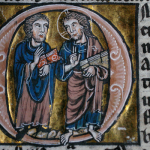Rome, Italy, Apr 11, 2015 / 04:02 am (CNA/EWTN News).- Despite Turkey's claim of religious freedom, Christians there have faced ongoing hostility, including government oppression and murder – but a new legal status ignites hope that things will improve. As far as the Turkish government is concerned, “Islam is the only possibility,” said Nikos Tzoikos, analyst of the Ecumenical Patriarchate of Constantinople. Tzoikos spoke with CNA in November of 2014 before Pope Francis' visit to Turkey that month. He said that an embedded relationship between Islam and the local government have rendered Christians in Turkey “without any rights.” However, a new foundation established by the Armenian patriarchate could signal a change in the right direction for Christians and the Turkish government. Officially established in January of this year, the foundation is called “Hovagim 1461” after the first Armenian patriarch Hovagim and the date when he was appointed to the position. It marks a significant step in securing more breathing room for the community, who, according to Tzoikos, have had “difficulty” with the government in terms of civil rights. Even though Turkey claims to have religious freedom nationwide, Christians still face discrimination, and their presence often goes unrecognized by the country's Muslim majority. There are believed to be only 100,000 Christians permanently living in Turkey, a small fraction of the country’s total population of 75 million, which is majority Sunni Muslim. Although Catholics are recognized as a religious minority, Christians have “always been segregated,” Tzoikos said, noting that prior to this January neither Jews, Orthodox nor Armenian Orthodox were recognized by the government. Even if members of the patriarchate are Turkish citizens born in Turkey, “they aren't protected,” he said, explaining that even popes have met resistance with the government ahead of apostolic voyages. Despite the fact that Turkey welcomed Pope Francis in November after he was invited by the Patriarch of Constantinople, Bartholomew I, and later by Turkey’s president Recep Tayyip Erdo?an, Tzoikos revealed that government channels for such visits haven't always been open. He recalled Benedict XVI's visit to Ankara and Istanbul in 2006, explaining that the then-Pope's visit “wasn’t wanted.” Even though Bartholomew had invited his “brother” Benedict to visit, “a pope can't personally go to meet the patriarch simply. He can't. He has to pass through Ankara for an official state visit. The Turkish government insists on this,” Tzoikos said. When Pope Francis visited the country last November Bartholomew I advised him to take diplomatic channels and make the same route, going to Ankara first for an official state visit, which Francis did. Tzoikos revealed that Benedict's trip should have originally taken place in 2005, but was blocked. With the change in Turkish government in 2006 the visit was blocked again. It was finally approved with the assassination of Italian priest Father Andrea Santoro, who was serving as a missionary in Turkey and was shot twice in the back while praying before Mass Feb. 5, 2006. It 's believed that the murder was committed in retaliation for cartoons printed against the Prophet Mohamed. After the priest's death Tzoikos said the Turkish government became fearful and finally approved Benedict XVI's visit. Such violence toward priests are not an uncommon occurrence in Turkey, and many have been attacked in recent years. In 2010 Bishop Luigi Padovese, who was overseeing the apostolic vicariate of Anatolia and had been outspoken on challenges facing Christians in Turkey, was stabbed to death outside of his residence by his long-term driver. The bishop's driver was a Muslim, however it's reported that the man, who had been suffering from depression, was unstable and that the bishop’s murder was not politically motivated. Tzoikos said that Christians also face difficulty in the area of education, and explained that although religion – which was previously allowed to be taught only in churches – is now a part of Turkey’s educational system, only teachers paid by the state are allowed to lead the courses. Mons. Georges Dankaye, rector of the Pontifical Armenian College in Rome, expressed his hope that the new foundation for the Armenian patriarchate will help in solidifying an awareness of the presence of Christians in Turkey, and obtain greater governmental support. “The foundation is a recognition of a reality. It’s not a foundation or creation of nothing. There is a reality that exists. It’s a recognition on a judicial level but also on a civil level. And this is also very good, because it’s the recognition of a community,” Mons. Dankaye told CNA Feb. 9. Turkish agency Hurriyet Daily News reports that the foundation has officially been registered in Istanbul's 22nd civil court. With a board of trustees composed of 10 members of the patriarchate, the foundation will be headed by the deputy Armenian Patriarch, Archbishop Aram Ate?yan, and will be able to make decisions financial matters. The list of activities for foundations in Turkey are listed in the law as: organizing seminars, conferences and workshops, providing information, documents and data, publishing magazines, newspapers and articles in line with the goals of the patriarchate and accepting donations both from Turkey and abroad. Hovagim 1461 also has the right to own property either by inheritance, purchase or donation. It will also have the ability to make investments through cooperation with other foundations. Mons. Dankaye said that this step is also “a democratic thing, that is, to recognize a community that has its specificities, its rights, its nuances, its special way of life, also social and religious. These are the first phenomena of a democracy.” Democracy, he said, doesn't mean “to standardize or homogenize” everyone, but rather to recognize and respect social and religious differences. He recalled the time of the Armenian genocide, the centenary of which takes place this month, saying that the mass killings perhaps came out of the Ottoman’s fear of recognizing these differences. The refusal to accept these differences, he said, stems from the idea that “we should all be the same, and whoever is not the same, whoever doesn’t think like us, needs to go or needs to die.” Also referred to as the Armenian Holocaust, the genocide took place in 1915 when the Ottoman Empire systematically exterminated its historic minority Armenian population who called Turkey their homeland, most of whom were Christians. Roughly 1.5 million Armenians lost their lives. In honor of the genocide's centenary, Pope Francis will offer his April 12 liturgy for Divine Mercy Sunday, the first Sunday after Easter, for faithful of the Armenian rite. During the Mass, which will be celebrated inside St. Peter's Basilica at 10 a.m., Francis will also proclaim Armenian-rite Saint Gregory of Narek a Doctor of the Church. The 10th century priest, monk, mystic, and poet will be the first Armenian to receive the title. Mons. Dankaye stressed the importance of remembering events such as the genocide specifically because of the witness of the martyrs, who serve as “a prototype,” and also to prevent future violence. If the genocide and other similar events are not kept tucked away in our memories, history will repeat itself, he said, noting that 100 years after the genocide “the same scene repeats itself: decapitating. Crucifixions. Slaughter. Burning people. Starve them and block zones…It repeats itself.” Pope Francis, although he refrained from making any political statement on the still-sensitive topic, mentioned the genocide during his trip to Turkey in November. He expressed hope that the border between Turkey and Armenia would be re-opened as a sign of reconciliation. Even if things don't change right away, Francis' words will help, the priest said, because the Pope is able to express his message in “a very intelligent, very simple and very courageous way.” “This is difficult to find in diplomacy,” he said, but “Pope Francis unifies everything: the courage of the politician, the simplicity of the message. He does not offend but he also does not leave his audience in peace.” Read more















